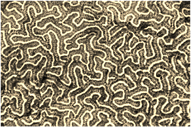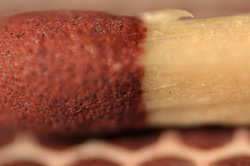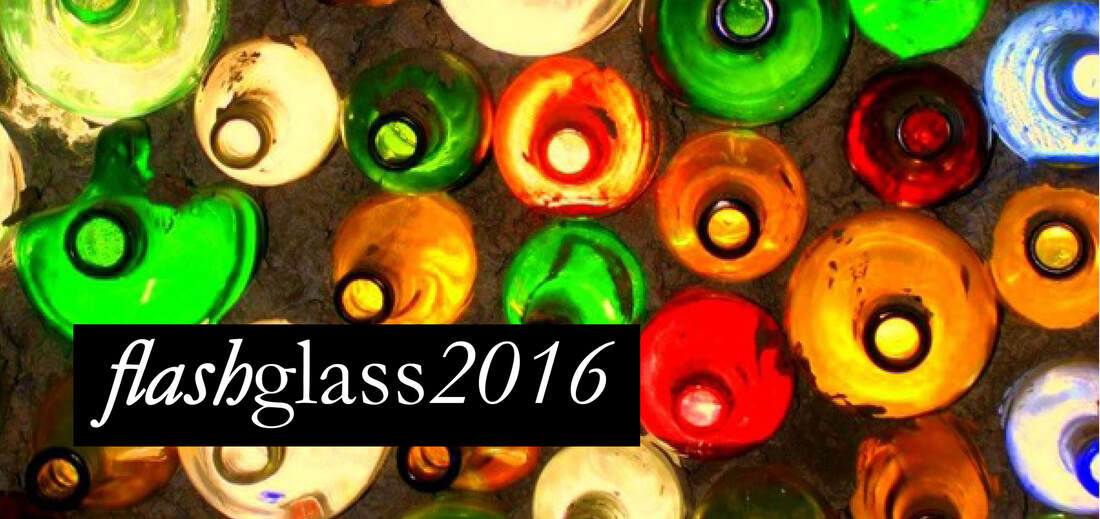"She says she is counting cars. Motorists who have seen her day after day for the past year imagine she may be contemplating suicide, taking down license plates, or waiting for a perfect time to disrupt the Woodrow Wilson Bridge. She is merely working, she says, on an 'independent marketing survey.' A nearby gas station attendant, who watches her every day, has long since given up wondering."  photo via flickr sparktography photo via flickr sparktography Long hair blowing like seaweed, she stands on the overpass counting the rush hour traffic below by entering tick marks on a clipboard. She is tall and slender and wears a long brown prairie skirt and yellow rubber rain boots. I have yet to see her face. She never looks away from the traffic or up from a newspaper stretched in her wide open grasp, and I wonder if she uses the paper to sight the line of cars as they surface to the top of her page. She is always alone, and with her long hair blowing and her arms outstretched she is like a Nereid on a bridge welcoming her guests back from the sea as they flow home safely beneath her. She is out again today and as I drive by I catch the tight curve of her long skirt and the turn of her ankle and wonder how it would be to make love to the traffic counter. Would she be as detached as when she counts the traffic, and lie there in a dull torpor while she counts the seconds then the minutes as she waits for me to finish, or would she be a human engine like the throbbing traffic she surveys, and would she, after I am spent, continue to surge over me as I try to keep pace beneath her while, one after another, I count her convulsions as they ebb and flow.  Ed McCafferty has had recent acceptances by Scribble, Clark Street Review, and Word Fountain, as well as previous poems in Poet Lore, Gargoyle, and Potomac Review among others. He is the author of the chapbook “Audrey and I Stride Forth” published by Argonne House Press, Washington DC (2002). He is also the author of a graduate textbook in chemistry entitled “Introduction to Corrosion Science” published in 2009 by Springer Press of New York. He lives in Alexandria, VA with his wife and two cats.
0 Comments
 Well, you see, she drowned the child. There was very little sound at all, no splashing really, just eighteen breath bubbles, rising popping dead. Just a baby, just a pink and fatty baby,and its face was kind of flat and it didn't have eyebrows yet, or fingernails worth clipping. She ran the water like normal and put in the plastic bear. She knelt down over the tub, water shallow,looking beige because the ugly tub was beige. She held it in her forearms, the child. She held it out, the child, deep pink against the flat white undersides of her forearms. The mirror started to fog. Her sleeves were rolled up her arms. She watched the tiny wisps of hair float out from the baby's soft head, imagined its bones still fusing under her fingers, still becoming, becoming two hundred and eighty bones, two hundred and forty, two hundred and six. She made sure the water didn't get in the baby's ears. Steven wasn't home, so she could say that it was an accident. She could say that she had left the room, that she had heard no sounds, that the child was just an accident. She could say I didn't know it would be like this. I didn't know it would hurt. She could say I hate this thing. I love this thing. I don't know who I am. And she did. You know, she talked to the baby in the tub. She let its feet slip between her elbows, little legs bending in. She let its bottom touch the ugly tub and she spread her forearms farther so the water could swaddle its back, its arms, its shoulders. She had her hands behind its head, her hands above the water just a little, just a little. Under the water the baby's body looked like liquid, like wavering, loose liquid, like those babies sucked from stomachs before they really were. She had asked Steven, had begged Steven, had told him she couldn't have it. She could not look like that in pictures. She would not look like that in pictures. She told him tailoring white lace and white beads was expensive, adding hem length, adding darts. She told him the dress is already bought, my mother would absolutely kill me. There is only one ring on my hand. There can't be any babies in my body. The baby sneezed. Sneezed again. Two clear lines leaked out its nose. The mother flipped it over, pressed the hand with two rings to its back. Counted eighteen bubbles. Counted only those eighteen micro-second sounds. She lifted her hands from the water, from the body, from the body’s brown halo of hair. She would say it was just an accident. She would say but I was its mother.
 There’s not much you can do when it’s over. Pack your things, light a cigarette, try not to think about it. And then you’re free. What can you do? Find someone to fuck, try to squeeze the last of your love out through your scrotum. Eyes closed you can pretend, and it does, it does feel almost right. But you wake up. You always wake up. You wake up and there’s this person, this stranger in your bed. At first you laugh; you think of your night. You try to think of a name and can’t. What matter? It’s not what you want anyway. Then there’s the blur, a name, another, the only thing you can remember is why and where it started. A carousel of leering faces, drinks, sticky floors, bathroom tears, a finger down the throat, stars above the streetlamps, who’s thinking of you tonight?, dive back in, shot of whiskey, a name, another, a drink, two, three, those eyes, that hair, what’s your name?, can I buy you a drink?, waving down the barkeep, forced laugh, what’s that? I can’t hear in here, a name, hi I’m..., my name is..., and what do you do?, dark street, walk to the next one, wave down the bartender, whiskey, a name, another, dark shoes,wet floor, music too loud, clench down the teeth, lights on the bottles, crooked broken smiles, funhouse flashes, what’s your name?, a drink, two, credit card, crisp five on the counter, is that right?, you don’t say?, that’s so interesting...wanna get out of here?, outside, stumbling against you, a cab, take us to 52nd, clutched hands, fingers in the fly, giggle, whisper, here’ll do, sidewalk, stars, where are you tonight?, just close your eyes, there like that, almost but not quite, not quite right, not right, just not right... Someone said, or I read somewhere, it’s like that, the first morning after. You wake up with your gut hard, hands wrapped around your stomach holding it in, oh god oh god not again please not again, scared of the kitchen, the bathroom, the dark spaces, looking anyway, is she in there?, are you in there?, no, nothing, nothing anywhere, nothing everywhere, no tears, the bed’s all you’ve got. Rob Hicks is from Texas. He travels, and writes, and works, and aches, and is confused, and strives like anyone else. His first book, Cornelia Avila, is available through Belle Tier Press.
 “The mind is a city like London,” said Delmore Schwartz. All gray matter and roundabouts. Bits of conversation with characters, vaguely familiar, walking too slowly, unsure of where to go next, pulling out their A-to-Z guides, trying to reacquaint themselves with how to get around, although how could you forget that, now hurrying to arrive at some chip shop by lunchtime. Curry stick and turkey patties and other difficulties. Someone is looking erratically at the fantastic architecture someone else erected centuries back and thinking: I could never do that. Before the drizzle draws attention. Details too trivial to mention on old brick buildings grab bystanders, possibly foreigners who like to practice talking. Don’t forget your French. Look left. Stop and make a note for future reference. Sirens moan while tubes turn hot and convoluted, but one has to continue. Keep calm and carry on no baggage through the afternoon sometimes turning, like the river, grim. Mind the gap between the asphalt and the water, the city and its story, history and literature: these fragments have been. And then the ruin, that is, collapse on the sofa in the lounge (come through!) in another winter with memories of minor poets. Tea might help the stomach. This tea tastes like the Thames. Didn’t Keats work at that hospital around the corner? But no matter, that is, no more. The sky turns pink and white, streaky as bacon, and will go dark by four o’clock, when the yellow sparkle of Canary Wharf lights up in the distance like a mini Manhattan. Sequins over the skyline all of a sudden, and time for dinner. Bubble and squeak, the day disappears. More work for tomorrow, more work. Cranes sway by the river. Time to trawl through the mud like memories. They have a group that meets. Scavenge roman coins, shark teeth. Something else to remember. Something else might be discovered. Or constructed. Before all the scaffolding comes down, and no one gets hurt. Even though the way out is not clear-cut. (Lamb Walk is not a shortcut.) But one goes on, doing his bit, trying to figure out what it is, while wishing for no worries, no knife attacks. But that’s all right, so many closed-circuit TV cameras. Someone will catch something eventually. And really: why can’t the mind be a city like New York?  Tara Deal is the author of That Night Alive: I’ve Come Close (forthcoming, winner of the 2016 novella prize from Miami University Press) and Palms Are Not Trees After All (winner of the 2007 novella prize from Texas Review Press). Her work has also appeared in Alimentum, failbetter, and West Branch, among others. She lives in New York City.  He hadn't expected to hear the whoosh, hadn't expected the sudden surge of energy in his body's response: skin tingling, fingers twitching, breath gasping in short pants. Orgasmic, as he'd think of it later, grasping for the right word and knowing he hadn't found it. Couldn't and wouldn't ever be able to describe, even to himself, the total sensuality of that moment when the sound, a gigantic expellant, filled his body to such a degree that his eyes closed, hands clenched, toes curled, as if trying to hold it within himself, keep it fast to indulge the feeling, pure feeling—make time stand still. How long he hovered at the edge of the yard, inhaling smoke and sirens, crackling sparks and flames brilliant against the spring night, he never knew, although he would try long weeks to reconstruct that time, wanting to understand his total surrender to a sensation unlike any he'd experienced in his fourteen years, as glass shattered in discordant peals, curtains wafted in billows of orange and red, roof and walls collapsed into a seething pyre, and all that was left of his early childhood was a charred rocking horse with a painted smile his mother could not bring herself to part with, and a long forgotten Tonka toy whose tires had melted with the heat. Later he would wonder how much of the scene he actually saw that night, how much was false memory acquired from TV and newspapers, national magazines even, so brilliant was the blaze. He remembers feeling cold, doesn't know how or when the shivering began, but it did. Remembers the first impulse to run up to his room and grab a sweater; remembers a body, arms, hands, blocking his way, pulling him back as he headed across the lawn, running to speed his circulation, teeth chattering despite the heat from the flames. Remembers the voice, deep, authoritative, "Keep back, keep away." And then another body, another set of arms and a woman's voice, young, he thinks, "He's in shock." And then he's sitting in an ambulance he hasn't seen arrive, a foil blanket like the ones he's seen in mountain rescues on TV, draped around his scrawny frame; a mug of something steaming in his hands. And he realizes he's lost the moment, knows it will not return, although he closes his eyes to make sure, just for a second. That is all he needs to feel the lurch of disappointment. Through the open ambulance doors he sees the house breathe its last, lingering breaths that will be gone tomorrow; watches the blaze, enormous, funereal; the onlookers—neighbors, police, firefighters, passing strangers—watchers as at a deathbed, accompanying a loved one to the threshold of departure, and no further. Tomorrow they will carry on with their lives, talk of this for a day or two, across breakfast tables, in coffee shops, gyms maybe. And then they will forget. But not he. Tomorrow he will think about his parents, wonder what he could have done, should have done. Tomorrow his fingers will skim along the surface of the matchbox in his pocket, linger on its perfect corners, feel the coarseness of its striking edge. And he will wonder. Claire Day was born and grew up in England, but has spent over half of her life in the United States. She now lives in Massachusetts, where she is inspired by the creative life around her. Her work has appeared in New Verse News, Silkworm, Peregrine, and American Writing. She was the recipient of a fellowship to the Connecticut Writing Project's Summer institute, and has led writing workshops using the Amherst Writers and Artists method. She is a quadruple Pushcart Prize nominee.
 Our first fall at the log house my father handed me an axe, said he’d teach me how to crack a tree to pieces in a day. We had moved there from Chicago in 1974 after the gas prices had grown too high and my mother was starting to talk. My mother watched us from the window, the axe bright and heavy in my hands. I felled thin blue spruces along the back edge of our yard, she patted boneless pink chicken legs with honey, lemon, sage. When I came in she hugged me, loose, said I swung just like him. One night in late September, lightning struck our fir tree. Its fat pine-coned branches exploded into a thousand yellow-black shards, splintering everything, the clover, earth, birds. There were rotten tomatoes stabbed through and dripping down their vines out back. The log house smelled like burning sap, hair held over candles for days. Around Christmas dad lost a finger and beat mom with a blue spruce log from a tree I had felled in the fall. He went out and peed in the woods, chicken burning in the oven. “It’s so cold,” he said, “my piss froze to the bark.” He said the log came from my pile, told me it was my fault. My mother slept in the hospital seven full months, brain swelling like a flower in a too-small pot. When the nurses walked by, my father held her hand. When they left, he dropped it like a bad plum, like a spider. I started seeing deer in the yard whenever he left the house. One day in July I saw a spotted one, a finger of wood jutting from its ear. My mother died that Saturday. I shot the deer the next Tuesday, cut the wood stud from its ear, kept it close. Dad and I brined the venison with lemon, salt, sage. My father ate it, proud of his son. I buried mine in the bed of dead tomatoes. After a month he found the plate and beat me out of the house. I left, took my mother from the hearth so he’d stop throwing bone scraps into the fire. Thirty years later my father calls, says he’s leaving the house to me. I drive eighty miles, close his hospital door. A nurse walks in, my hand loosens from the wet wood shard. It is the first day of fall.
|
FLASH GLASS: A MONTHLY PUBLICATION OF FLASH FICTION, PROSE POETRY, & MICRO ESSAYSCategories
All
Cover Image:
|
|
Glassworks is a publication of Rowan University's Master of Arts in Writing 260 Victoria Street • Glassboro, New Jersey 08028 glassworksmagazine@rowan.edu |
All Content on this Site (c) 2024 Glassworks
|




 RSS Feed
RSS Feed
